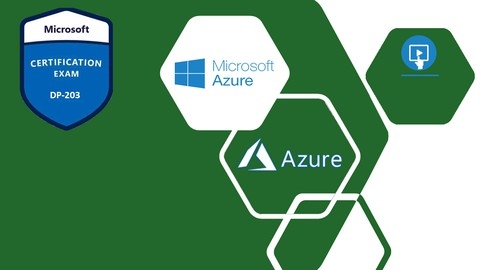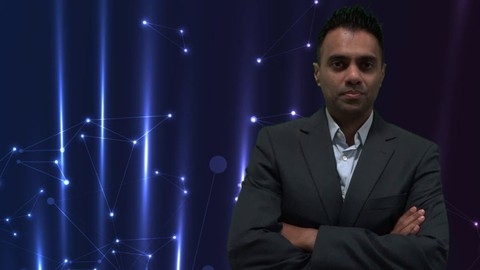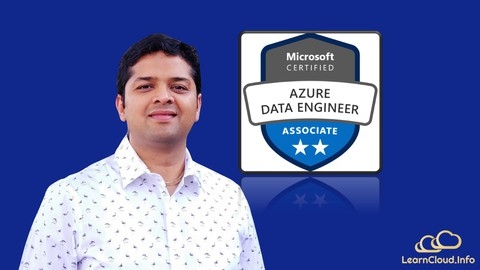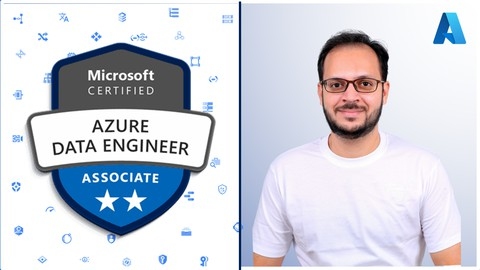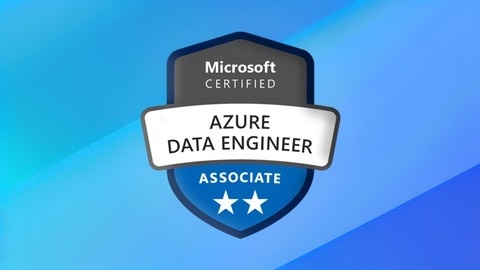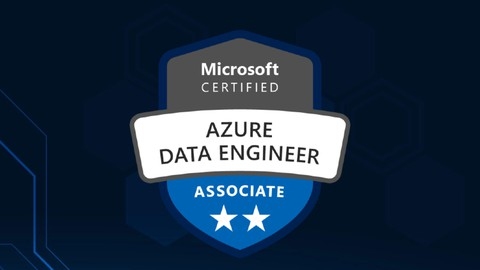Mastering Microsoft Azure Data Engineering is a crucial step for anyone wanting to work with cloud-based data solutions, and earning the DP-203 certification can be a significant boost to your career.
But finding the right course to prepare for the exam can be a daunting task with so many options available.
You want a course that’s comprehensive, engaging, and taught by experts, one that’s tailored to your specific learning style and goals.
That’s where this guide comes in!
We’ve compiled a list of the best Microsoft DP-203 courses on Udemy, carefully curated to help you ace your exam and become a confident Azure data engineer.
For the best DP-203 course overall, we recommend DP-203 - Data Engineering on Microsoft Azure.
This course is praised for its comprehensive coverage of all the essential concepts and skills, from creating an Azure account to building data pipelines with Azure Data Factory and Azure Databricks.
It’s designed to make you feel confident in tackling the exam and mastering real-world data engineering challenges.
But don’t stop there!
We’ve got a variety of other fantastic courses on this list, catering to different learning styles and levels of expertise.
Read on to find the perfect DP-203 course for you!
DP-203 - Data Engineering on Microsoft Azure
The syllabus covers a wide range of topics, starting with the basics of cloud computing and Azure.
You’ll learn how to create an Azure account, navigate the Azure portal, and understand different data storage options like Azure Storage accounts, Azure SQL databases, and the modern Azure Data Lake Gen-2 storage.
The course even shows you how to connect applications to these data stores.
Moving on, you’ll dive deep into Transact-SQL (T-SQL) and learn about database internals, creating tables with keys, joins, and various clauses like SELECT, WHERE, ORDER BY, and aggregate functions.
This lays a solid foundation for working with Azure Synapse Analytics, a powerful analytics service that combines data warehousing and big data analytics.
The syllabus covers designing and implementing Azure Synapse workspaces, exploring compute options, working with external tables (CSV, Parquet), loading data using COPY and PolyBase, and even building a star schema data warehouse.
You’ll also learn about table distributions, indexing, partitioning, and slowly changing dimensions – essential concepts for optimizing performance.
A significant portion is dedicated to Azure Data Factory, Microsoft’s cloud-based ETL and data integration service.
You’ll learn how to build pipelines, use mapping data flows for data transformations, handle JSON data, implement self-hosted integration runtimes, and integrate with other Azure services like Event Hubs and Stream Analytics.
Speaking of real-time data processing, the course covers Azure Event Hubs (for ingesting streaming data) and Azure Stream Analytics (for real-time analytics on streaming data).
You’ll learn how to create Event Hubs, send/receive events using .NET, define Stream Analytics jobs, formulate queries, handle windowing functions, and even integrate with Power BI for visualizations.
The syllabus also introduces you to Scala programming language and using Jupyter Notebooks with Azure Synapse’s Spark pools for big data processing.
You’ll learn how to load data, perform transformations, and write data back to Azure Synapse using Scala and Python code.
Azure Databricks, a popular platform for running Apache Spark workloads, is also covered.
You’ll create Databricks workspaces, clusters, load data from various sources (including streaming from Event Hubs), perform transformations, and integrate with Azure Synapse.
Data security is a crucial aspect, and the course doesn’t disappoint.
You’ll learn about securing Azure Data Lake Gen-2 using account keys, shared access signatures, Azure Active Directory integration, and access control lists.
The syllabus also covers data encryption, masking, column/row-level security, and Azure AD authentication for Azure Synapse.
Finally, you’ll explore monitoring and optimization techniques for data storage and processing using services like Microsoft Purview (for data governance), Azure Monitor (for alerts and metrics), and workload management in Azure Synapse.
The course even touches on performance tuning aspects like access tiers, lifecycle policies, and transaction logging.
DP-203: Data Engineering on Microsoft Azure - 2022
The course begins with an introduction to cloud computing and the role of a data engineer.
You’ll learn about the evolution of this profession, the responsibilities it entails, and the technologies commonly used by data engineers.
This section provides a solid foundation for understanding the context in which you’ll be working.
Next, the course dives into data storage options on Azure, covering both non-relational and relational data stores.
You’ll explore Azure Blob Storage, Azure Data Lake Storage Gen2, Azure Table Storage, Azure Queue Storage, and Azure File Share Storage.
Additionally, you’ll learn about Azure Cosmos DB, a globally distributed, multi-model database service.
For relational data stores, the course covers Azure SQL Database, Azure Elastic Database, and Azure Synapse Analytics (formerly SQL Data Warehouse).
You’ll learn about provisioning, scaling, security, high availability, disaster recovery, and monitoring for these services.
The course then focuses on batch processing and stream processing, two essential components of data engineering.
You’ll learn how to design and develop data processing solutions using Azure Data Factory, Azure Databricks, and Azure Stream Analytics.
Hands-on demos will guide you through tasks like copying data, transforming data using Databricks notebooks, and processing real-time data streams.
Monitoring is a crucial aspect of data engineering, and the course covers monitoring data storage and data processing solutions.
You’ll learn how to use Azure Monitor to track the performance and health of your Azure resources.
Optimizing Azure data solutions is another key topic covered in the course.
You’ll learn techniques for troubleshooting data partitioning bottlenecks, optimizing data lake storage, stream analytics, and Azure Synapse Analytics.
Additionally, you’ll explore strategies for managing the data lifecycle.
The course also provides guidance on designing Azure data solutions, covering topics such as data types, storage types, architecture patterns, real-time processing, compute resource provisioning, and security considerations.
Throughout the course, you’ll have access to practice tests and quizzes to reinforce your learning and prepare for the DP-203 certification exam.
The course also includes additional study materials and resources to further enhance your understanding.
Practice Exams | Microsoft Azure DP-203 Data Engineering
This set of practice exams touches the core concepts of Azure Data Engineering, equipping you with the knowledge and skills needed to confidently tackle the real exam.
You’ll gain a deep understanding of data storage and manipulation, exploring how to leverage essential Azure services like Azure Data Lake Storage and Azure Synapse Analytics.
Learn how to effectively ingest data from diverse sources, transform it using various tools and languages, and then apply real-time processing techniques using Azure Stream Analytics.
This course goes beyond theoretical knowledge by providing hands-on experience through practice tests designed to mirror the real DP-203 exam.
These tests will challenge you on a broad range of topics, from data exploration and pipeline design to data security and optimization.
You’ll become proficient in languages like T-SQL, Python, and Scala, enabling you to build efficient data pipelines and optimize data storage.
You’ll also gain a strong understanding of security practices, including encryption, row-level and column-level security, and access control through Azure RBAC and POSIX-like access control lists.
DP-203 : Microsoft Certified Azure Data Engineer Associate
The course begins by introducing you to the world of Azure Storage Services.
Here, you’ll delve into the workings of Azure Blob Storage, Azure Table, and Azure Queue, learning how to provision storage accounts and grasping the intricacies of data replication.
You’ll then explore Azure SQL Database and dive deep into Azure Cosmos DB, equipping you with the knowledge to handle NoSQL solutions effectively.
Next, you’ll be guided through the powerful capabilities of Azure Data Factory.
This module will teach you how to construct data pipelines and manage data integration processes with confidence.
You’ll become proficient in utilizing copy data activities, control flow activities, and gain hands-on experience with DataFlow.
This section is crucial for mastering data transformation and orchestration within the Azure environment.
The course then moves on to Azure Synapse Analytics, a robust tool for data warehousing and analytics.
You’ll learn to create Synapse Analytics workspaces, analyze data using both serverless and dedicated SQL pools, and even work with Apache Spark pools.
Finally, the course culminates with a focus on Azure Databricks, a popular platform for data engineering and machine learning.
You’ll learn how to create Databricks workspaces, manage clusters, and work effectively with Delta Lake.
The course also incorporates a section on Azure Stream Analytics, empowering you to process real-time data streams from various sources, including Event Hubs and IoT Hubs.
By completing this comprehensive course, you’ll have a solid foundation in Azure Data Engineering, encompassing essential tools, services, and concepts.
You’ll be well-prepared for the DP-203 certification exam, which will demonstrate your expertise and open up a wealth of career opportunities in the dynamic field of Azure Data Engineering.
Exam DP-203: Data Engineering on Microsoft Azure Exam
You’re looking for a comprehensive way to master Microsoft Azure Data Engineering and ace the DP-203 exam, and this course definitely stands out as a strong contender.
It’s not just about passing the test; it’s designed to equip you with the real-world skills that will make you a valuable asset in today’s data-driven landscape.
The course emphasizes practical application, going beyond rote memorization.
You’ll gain a deep understanding of data pipelines, optimization strategies, and the intricacies of data orchestration on Azure.
The five practice tests, meticulously crafted to mirror the real exam experience, will help you build confidence and familiarity with the exam format, especially the challenging non-binary questions.
Detailed explanations for each question provide valuable insights and solidify your understanding of the concepts.
One thing that sets this course apart is its focus on staying current.
The content is regularly updated to reflect the latest advancements in Azure data engineering, ensuring you’re always working with the most relevant information.
While the course offers a solid foundation, I’d recommend exploring the instructor’s credentials and experience in data engineering.
This will help you gauge their ability to translate complex concepts into readily digestible learning experiences.
Ultimately, this course presents a strong opportunity to boost your data engineering skills and achieve your certification goals.
By combining comprehensive content with practical application and ongoing updates, it aims to empower you to tackle real-world challenges with confidence.
Exam DP-203: Microsoft Azure Data Engineer Associate - Tests
The focus here is on practice, and the course delivers with a comprehensive set of tests designed to mirror the real DP-203 exam.
You’ll dive deep into essential Azure data services, learning the ins and outs of designing storage solutions with Azure SQL Database, Cosmos DB, and Data Lake Storage.
You’ll also master data processing with Azure Data Factory, Stream Analytics, Synapse Analytics, and Databricks – the tools of the trade for any data engineer.
What sets this course apart is the attention to detail.
Each question comes with a detailed explanation, ensuring that you not only get the answer right but also understand the underlying concepts.
This is particularly valuable for those new to Azure, as it provides a structured learning experience.
This course goes from designing data storage and implementing data exploration layers to developing both batch and stream processing solutions.
Security, monitoring, and optimization are also addressed, ensuring that you gain a well-rounded understanding of building efficient and reliable data solutions.
The course recommends aiming for a score of 90% or higher on each test, which is a challenging but achievable goal.
You’ll have the opportunity to review your answers and understand why you got them right or wrong, reinforcing your learning.
The questions are updated regularly, so you’re always getting the most relevant practice.
This course is a valuable resource for anyone serious about becoming a Microsoft Azure Data Engineer Associate.
It provides the tools and knowledge you need to build a strong foundation and confidently approach the exam.
Microsoft DP-203 Practice Test
In this course you’ll not only gain a thorough understanding of the service itself, but also a broader grasp of the Azure ecosystem, including essential services like Azure Active Directory.
The course delves deep into the core functionalities of Azure Data Factory, guiding you through the process of building and managing data pipelines.
You’ll learn to effectively configure trigger events, making your data pipelines truly dynamic, and explore powerful data flow activities, enabling you to manipulate data with precision and ensure its quality.
Beyond data management, you’ll discover how to integrate data from other Azure services, like Azure Data Lake, creating a cohesive data ecosystem.
This hands-on approach, bolstered by practical exercises and real-world scenarios, will equip you with the skills to design, deploy, and monitor data pipelines with confidence.
The accompanying Microsoft DP-203 exam, covering key areas like Azure Data Factory, Azure Data Lake, and Azure Data Services, is a great way to validate your newfound expertise.
Be prepared to tackle diverse scenarios, demonstrating your ability to navigate the complexities of data engineering in the Azure environment.
DP-203: Data Engineering on Microsoft Azure Practice Tests
This DP-203 practice test course provides a comprehensive, well-structured approach to mastering the skills needed for the certification exam.
You’ll find that the course is particularly effective in preparing you for the diverse range of question formats on the real exam.
This is crucial, as Microsoft’s DP-203 exam often utilizes hotspots, use cases, multiple choice, drag-and-drop questions, and more.
What sets these practice tests apart is their detailed coverage of all essential Azure data engineering concepts.
You’ll delve into data storage solutions like Azure Synapse Analytics and Azure Data Lake Storage Gen 2, exploring their functionalities and nuances.
The course also offers a thorough exploration of data processing techniques using T-SQL, Apache Spark, and Azure Synapse pipelines, equipping you with practical skills for both batch and stream processing.
Beyond data storage and processing, you’ll gain a solid understanding of data security practices, including encryption, data masking, and row/column level security.
The tests also emphasize the importance of monitoring and troubleshooting, preparing you to identify and resolve issues within your data pipelines.
The course’s structure and content mirror the real exam experience, allowing you to build confidence and familiarity with the exam environment.
By utilizing these practice tests, you’ll be well-equipped to tackle the DP-203 exam with greater confidence and secure your Azure data engineering certification.
Exam DP-203 Data Engineering on Microsoft Azure(beta) prep..
This practice test provides a comprehensive overview of the key concepts and skills required for success in this field.
You’ll find a well-structured approach to learning, covering essential areas like designing and implementing data storage, developing data processing systems, and securing your valuable data.
The practice test’s strength lies in its focus on real-world application.
You’ll encounter a range of practice questions and answers that simulate common scenarios, helping you build confidence in tackling data engineering challenges.
The emphasis on various business case studies gives you a practical understanding of how these concepts translate to different industry contexts.
While the practice test provides a solid foundation, you’ll want to ensure it complements your overall preparation strategy.
Consider reviewing the Microsoft Azure documentation and utilizing other available resources for a well-rounded learning experience.
Ultimately, this practice test can serve as a valuable tool for gauging your understanding and identifying areas where further study might be needed.
By utilizing the practice test effectively and incorporating it with your broader learning plan, you’ll be well-equipped to tackle the DP-203 exam with confidence.
Microsoft DP-203 Exam Practice Questions Updated Nov 2023
You’ll start by exploring the fundamentals of data storage, learning how to design and implement strategies using Azure Data Lake Storage Gen2 and partition techniques tailored to various workloads.
You’ll master data exploration by crafting queries that leverage SQL serverless and Spark clusters, making sense of your data using Microsoft Purview.
The course truly shines when it delves into data processing.
You’ll gain hands-on experience ingesting and transforming data using powerful tools like Apache Spark, Transact-SQL (T-SQL) in Azure Synapse Analytics, and Azure Synapse Pipelines or Azure Data Factory.
You’ll learn to handle common data challenges like duplicates, missing values, and late-arriving data, mastering techniques like Azure Stream Analytics’ Exactly Once Delivery to ensure data integrity.
You’ll then build both batch and stream processing solutions, leveraging technologies like Azure Databricks, Azure Synapse Analytics, and Azure Event Hubs.
You’ll learn how to manage data pipelines efficiently, using concepts like upsert operations and checkpointing for stream processing.
You’ll also gain the expertise needed to secure your data pipelines, implementing measures like encryption, row-level security, and Azure role-based access control (RBAC).
Finally, you’ll dive into monitoring and troubleshooting, utilizing Azure Monitor to track performance and debug issues.
You’ll learn how to optimize query performance, troubleshoot failed Spark jobs, and handle data skew and resource management.
This course goes beyond the basics, providing you with the tools and knowledge needed to design, build, and manage efficient and secure data solutions on Azure.
